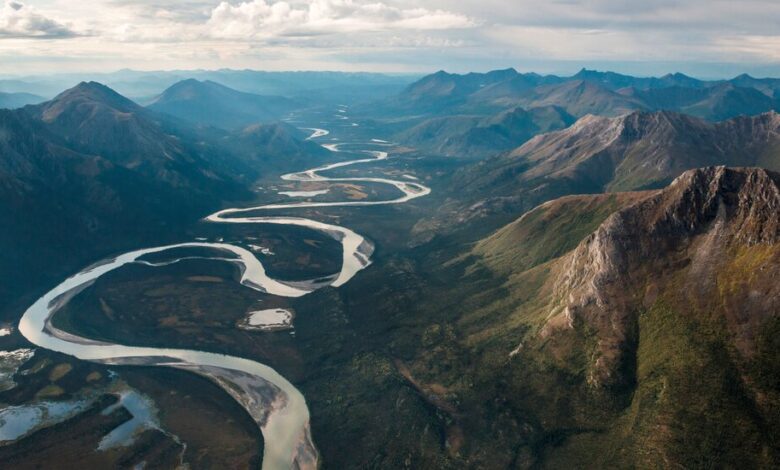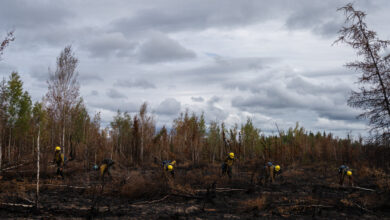The Biden administration denies mining and drilling access to the Alaskan wilderness

The Biden administration has denied a permit for an Alaska agency to build a 211-mile industrial road through the Gates of the Arctic National Park and Preserve to access copper and zinc mines beneath pristine wilderness.
Separately, the administration said it plans to maintain protections for 28 million acres of land scattered across Alaska that the Trump administration has tried to open to mining and oil and gas drilling. This land includes unique habitat for three large caribou herds, migratory birds and Pacific salmon.
The two Interior Department decisions are part of a steady stream of environmental moves President Biden has made ahead of the November election aimed at bolstering his standing among conservationists, a key constituency. Climate activists have pressed the administration to do more to protect public lands from new oil and gas projects.
“Today, my administration is preventing a 211-mile road from undercutting a pristine area that Alaska Native communities rely on, in addition to steps we are taking to maintain protections. 28 million acres in Alaska from mining and drilling,” Biden said in a statement. “These natural wonders require our protection.”
In blocking the road, known as the Ambler Access Project, the administration prioritized preserving and protecting tribal communities that depend on hunting and fishing in the area over mineral development that could generate more clean energy.
The proposed industrial road is seen as essential to accessing an estimated $7.5 billion copper deposit. Ambler Metals, the mining company behind the project, says the copper it seeks is vital to the production of wind turbines, photovoltaic cells and transmission lines needed for renewable energy.
Ambler Metals accused the Biden administration of rejecting the path “not based on the project but on national politics in an election year.” The company said it would “explore all legal, legislative and regulatory avenues to move forward.”
The two-lane, year-round gravel road would run through the Brooks Range foothills and Gates of the Arctic National Park and Preserve, crossing 11 rivers and thousands of streams before reaching the site of a future mine. The area is home to some of the most ecologically vulnerable wildlife in the world. Because it would cut through federal land, a permit from the Department of the Interior would be required.
The Interior Department found that a road would disrupt habitat, pollute salmon spawning grounds, and threaten the traditional hunting and fishing practices of more than 30 Alaska Native communities. The agency concluded that any version of an industrial road would “cause significant and irreparable harm” to the environment and tribal communities.
The Trump administration approved the permit for Ambler Road in 2020.
After Mr. Biden was elected, the Interior Department ordered a new analysis, saying the environmental impact of the road had not been adequately studied by the previous administration. In April, the department said it would recommend that no version of the road be built.
“The Department of the Interior takes seriously our obligation to manage America’s public lands for the benefit of all,” Interior Secretary Deb Haaland said in a statement. “In Alaska, that includes ensuring that we consider the impact of proposed actions on rural residential users and Alaska Natives.”
Another Interior Department decision affects land known as D-1 in Alaska, which was withdrawn from development in 1971 under the Alaska Native Claims Settlement Act.
The Trump administration had intended to end protections for about 28 million acres of D-1 lands. Immediately after Mr. Biden took office, the Interior Department declared the Trump administration’s move legally flawed and launched a new environmental assessment.
That assessment found that revoking protections is likely to harm subsistence hunting and fishing in 117 communities and could cause long-term harm to wildlife wilderness, vegetation and frozen ground are called permafrost. The Department of the Interior recommends that this land remain protected under federal law.
Alaskan tribal leaders praised these decisions.
“I am very lucky to have been raised in a wonderful place. I am a Neltsene, I come from the Bear tribe,” said Julie Roberts-Hyslop, the first chief of the Tanana tribe, in a statement.
“Alaska is one of the most wild places in the world and I feel an obligation to protect it for our future generations,” she added. “Our tribal nations rejoice at this positive news.”
Frank Thompson, chief of Evansville, an Alaska Native village at the foot of the Brooks Range, said his tribal council has been fighting the project for eight years. “Today is a happy day,” he said.
Alaska’s congressional delegation, which unanimously supported the road project, is expected to oppose the decision.
Sen. Dan Sullivan, Republican of Alaska, said last week he added an amendment to the annual defense bill that would force the Interior Department to choose a direction for the project. He called the Biden administration’s decision “lawless.”
Representative Mary Peltola, the first Alaska Native to represent the state in Congress and Alaska’s only Democrat, said in a statement that she supports Mr. Sullivan’s efforts and believes there is “a path forward” for the Ambler Road project.



